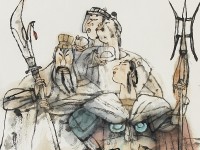Beauties and Heroes: Legends and Stories in Chinese Art
(from 21st Jan until 15th Jul 2012)Explore paintings, prints and papercuts depicting legendary figures from Chinese folklore.

Scene from White Snake
-
Description
The story of White Snake originated in the 13th century, and through oral storytelling developed into different versions. A heavenly snake-turned-beauty marries Xu Xian, who saved her in his previous life. A knowing monk persuades Xu to give the beauty drugged wine that will reveal her identity, and she is depicted in this painting having just drunk it. The widely known version in the Qing opera has a happy ending in which the White Snake’s son passes his civil service exam and saves her from the monk’s quelling. The opera is often played on the fifth day of the fifth month when realgar wine is used to drive away poisonous creatures such as snakes.
-
Details
- Associated place
-
Asia › China › Jiangsu province › Nanjing (place of creation)
- Date
- 1990
- Artist/maker
-
Gao Made (1919 - 2007) (artist)
- Material and technique
- ink and colour on paper
- Dimensions
-
frame 61 x 66 x 2.5 cm (height x width x depth)
painting 33 x 42 cm (height x width)
- Material index
- Technique index
- Object type index
- No. of items
- 1
- Credit line
- Presented in honour of the forthcoming 70th birthdays of Jose Mauricio and Angelita Trinidad Reyes, 1995.
- Accession no.
- EA1995.190
-
Further reading
Oxford: Ashmolean Museum, 24 September-1 December 1996, Modern Chinese Paintings: The Reyes Collection in the Ashmolean Museum, Oxford, Vainker, Shelagh (Oxford: Ashmolean Museum, 1996), no. 23 on p. 29, illus. p. 29 fig. 23
Past Exhibition
see (1)Location
-
- currently in research collection
Objects are sometimes moved to a different location. Our object location data is usually updated on a monthly basis. Contact the Jameel Study Centre if you are planning to visit the museum to see a particular object on display, or would like to arrange an appointment to see an object in our reserve collections.
Publications online
-

Modern Chinese Paintings: The Reyes Collection in the Ashmolean Museum, Oxford
Gao Made is a largely self-taught painter, influenced by Ye Qianyu and known as a cartoonist and illustrator of scenes from opera. The Peking opera "White Snake" tells of a heavenly snake turned beauty who marries a Master Xu. A knowing monk persuads Xu to give her drugged wine which will reveal her identity, and she is depicted here having just drunk it.
Notice
Objects from past exhibitions may have now returned to our stores or a lender. Click into an individual object record to confirm whether or not an object is currently on display. Our object location data is usually updated on a monthly basis, so please contact the Jameel Study Centre if you are planning to visit the museum to see a particular Eastern Art object.
© 2013 University of Oxford - Ashmolean Museum


